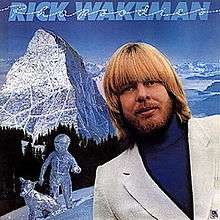Rhapsodies (album)
Rhapsodies is a double LP by keyboardist Rick Wakeman, which was released in 1979. It was his last studio release on A&M.
| Rhapsodies | ||||
|---|---|---|---|---|
 | ||||
| Studio album by | ||||
| Released | May 1979 | |||
| Recorded | 1978–79 | |||
| Studio | La Grange; Mountain, Switzerland | |||
| Genre | Progressive rock | |||
| Length | 67:14 | |||
| Label | A&M SP-6501 | |||
| Producer | Tony Visconti | |||
| Rick Wakeman chronology | ||||
| ||||
| Review scores | |
|---|---|
| Source | Rating |
| Allmusic | |
| Smash Hits | 4/10[2] |
Track listing
Side one
- "Pedra da Gavea" – 4:11
- "Front Line" – 3:42
- "Bombay Duck" – 3:14
- "Animal Showdown (Yes We Have No Bananas)" – 2:40 (Wakeman, Frank Silver, Irving Cohn)
- "Big Ben" – 3:48
Side two
- "Rhapsody in Blue" – 5:26 (George Gershwin; arranged by Tony Visconti)
- "Wooly Willy Tango" – 3:24
- "The Pulse" – 5:21
- "Swan Lager" – 2:50 (music taken from Tchaikovsky's "Swan Lake" and Grieg's pianoforte "Concerto in A Minor"; arranged and adapted by Rick Wakeman)
Side three
- "March of the Gladiators" – 4:53
- "Flacons de Neige" – 5:01
- "The Flasher" – 5:32
- "The Palais" – 2:23
Side four
- "Stand-By" – 3:30
- "Sea Horses" – 3:52
- "Half Holiday" – 3:00
- "Summertime" – 4:27 (George Gershwin, DuBose Heyward; arranged by Rick Wakeman)
- "Credits" - 2:39
Charts
| Chart | Peak position |
|---|---|
| Norway (1979) | 15[3] |
| UK Albums Chart (1979) | 25[4] |
| United States Billboard 200 (1979) | 170[5] |
Personnel
- Rick Wakeman - keyboards, likely vocals and vocoder on "Pedra da Gavea".
- Nico Ramsden - electric guitar
- Tony Visconti - acoustic guitar, engineer
- Bruce Lynch - bass guitars
- Frank Gibson, Jr. - drums and percussion
- Technical
- David K. Richards - assistant engineer
- Michael Ross - album design
- Paul Wakefield - photography
gollark: CPUs have a bunch of privilege separation mechanisms, but flaws in them sometimes get around those.
gollark: The general thing with these flaws is just that the CPU behaves in some way it shouldn't/isn't documented as doing, so information is leaked from places or stuff which shouldn't be changed is changed.
gollark: Or static analysis of some sort, but detecting malware without just banning tons of legitimate code is extremely hard and possibly impossible.
gollark: Probably! Antiviruses aren't foolproof.
gollark: *Nothing* can magically distinguish malware and not-malware software (both contain code).
References
- Raiteri, Stephen. "Rhapsodies - Rick Wakeman". allmusic.com. Retrieved 14 April 2020.
- Starr, Red. "Albums". Smash Hits (June 14–27, 1979): 25.
- http://tsort.info/music/3rbt8v.htm
- http://www.officialcharts.com/search/albums/white%20rock/
- http://www.billboard.com/artist/365039/rick-wakeman/chart
This article is issued from Wikipedia. The text is licensed under Creative Commons - Attribution - Sharealike. Additional terms may apply for the media files.